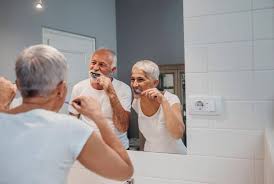Bath vs. Shower in Elderly Care: Which Is Safer and More Comfortable?
A Caregiver’s Guide to Hygiene, Safety, and Dignity for Seniors
Teresa Miller
8/19/20252 min read


👵 Why Hygiene Matters in Senior Care
Maintaining personal hygiene is essential for older adults—not just for health, but for emotional well-being and dignity. According to the National Institute on Aging and Willows Healthcare, proper hygiene helps prevent infections, reduces fall risks, and supports overall wellness.
However, seniors often face challenges such as:
Limited mobility or balance
Cognitive decline (e.g., dementia, Alzheimer’s)
Sensory impairments (vision, hearing)
Chronic conditions like arthritis or Parkinson’s
These factors make choosing the right hygiene method—bath or shower—critical for safety and comfort.
🛀 Bathing vs. 🚿 Showering: Pros and Cons for Elderly Adults
Bathing: Gentle and Familiar
Baths can be soothing and less physically demanding for seniors with joint pain or limited mobility.
Pros:
Reduces anxiety and promotes relaxation
Easier on joints and muscles
May feel more familiar and comforting
Cons:
Risk of slipping when entering/exiting the tub
Requires more water and time
May demand more caregiver assistance
Showering: Efficient and Adaptable
Showers are often quicker and easier to modify with safety equipment.
Pros:
Uses less water and energy
Easier to adapt with grab bars and shower chairs
Can be more stimulating for individuals with dementia (Alzheimer’s Society)
Cons:
Standing may be difficult for some seniors
Risk of slipping on wet surfaces
May feel rushed or overwhelming
🧠 How to Choose: Bath or Shower?
To determine the best hygiene method for your loved one, consider:
Mobility and Balance – Can they safely navigate a tub or shower?
Cognitive Function – Do they have dementia or Alzheimer’s? Which method feels more calming?
Medical Conditions – Are there physical limitations that affect bathing or showering?
Personal Preference – What makes them feel most comfortable and dignified?
🛡️ Caregiver Tips for Safe Hygiene
Whether you choose a bath or shower, these tips can help:
Install grab bars and non-slip mats – Reduce fall risk with simple safety upgrades (Amedisys)
Use adaptive equipment – Shower chairs, handheld sprayers, and transfer benches promote independence
Create a calming environment – Soft lighting, warm towels, and gentle conversation ease anxiety
Monitor regularly – Reassess needs as health and mobility change
Use mild cleansers – Protect sensitive skin with gentle products (Human Health Mag)
💬 Final Thoughts: Dignity Through Hygiene
Hygiene isn’t just about cleanliness—it’s about preserving identity, autonomy, and emotional well-being. As the National Institute on Aging notes, aging often shifts our focus from independence to interdependence. Caregivers play a vital role in this transition, offering not just physical support but emotional reassurance.
By choosing the right hygiene method and adapting it with care, you’re helping your loved one feel seen, respected, and safe.
⚖️ Legal Disclaimer
This article is for informational purposes only and does not constitute medical or professional advice. Always consult with qualified healthcare providers before making decisions related to elderly care.
🤖 AI Disclosure
This content was generated with the assistance of artificial intelligence (AI) tools. While we strive for accuracy and clarity, readers are encouraged to verify sources and consult professionals for personalized guidance.
My Elderly Solutions Plus
Credits: PICRYL Archive
Disclosure: "This site uses affiliate links. We may earn a small commission from qualifying purchases made through these links, at no extra cost to you."